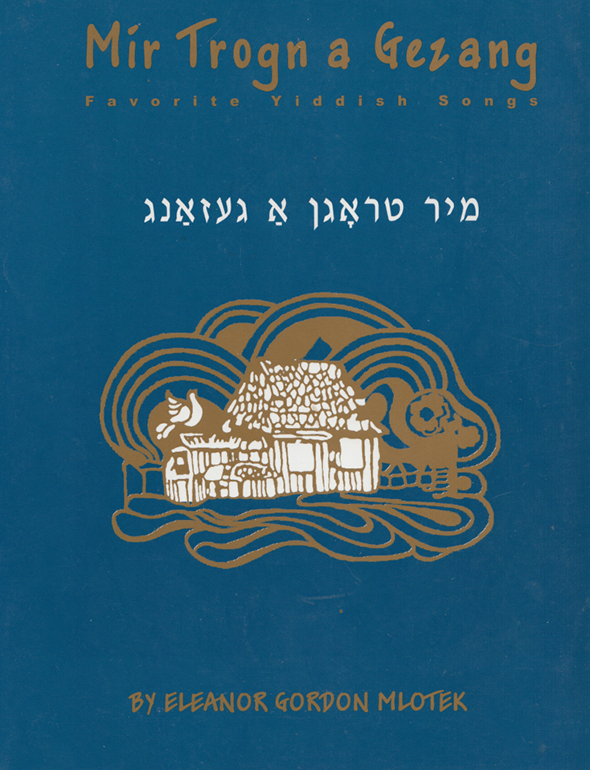This is part of a song written in 1888, by Elyokum Zunser (1836-1913), famous Badkhn (wedding entertainer). Di Sokhe is one of the first and most popular songs of Zion about pioneering in Israel. In Soviet Russia it was changed to extol, not the plow, but Stalin. “Our father Stalin gave us the best free life. I rise in the morning, don’t have to worry, don’t have to borrow.”

In the plow
lies good fortune,
the true happiness of life,
I am not lacking for anything!
The dawn comes,
I don’t need to borrow or lend
my mind need not worry
about the day’s expenses, or money.
I’ve stored up for winter
a healthy store,
I sow and harvest cheerfully–
free in God’s world.
In riches,
who can compare to me?
Who lives as calmly and happily
as I, a peasant in the field.
As long as God gives rain,
I feel my good fortune and blessing.
I ship grain bundles by the wagonloads,
sustenance for the world.
I nourish people,
merchants and grain dealers,
shippers, and brokers –
and my money is legitimately earned.
In sokhe
Ligt di mazl-brokhe,
Der varer glik fun lebn,
Keyn zakh mir nit felt!
Es kumt der frimorgn,
lkh darf nit layen, borgn,
Der moyekh darf nit zorgn
Oyf tog-hoytsoes, gelt.
S’iz ongegreyt oyf vinter
A zasik a gezunter,
lkh zey un shnayd gants munter —
Fray in gotes velt. . .
Fun raykhn
Ver ken zikh tsu mir glaykhn?
Ver lebt ruik, gliklekh
Vi ikh, poyer in feld?
Git nor got dem regn,
Fil ikh glik un zegn,
lkh fir shoyn snopes-vegn,
Kheyune far der velt.
lkh tu layt dernern,
Marklayt un shpaykhlern,
Shifers, komisyonern —
Un kosher iz mayn gelt.
אין סאַכע
ליגט די מזל-ברכה
דער װאַרער גליק פֿון לעבן,
קײן זאַך מיר ניט פֿעלט!
עס קומט דער פֿרימאָרגן,
איך דאַרף ניט לײַען, באָרגן,
דער מוח דאַרף ניט זאָרגן
אױף טאָג-הוצאות, געלט.
ס’איז אָנגעגרײיט אױף װינטער
אַ זאַסיק אַ געזונטער,
איך זײ און שנײַד גאַנץ מונטער —
פֿרײַ אין גאָטעס װועלט. . .
פֿון רײַכן
װער קען זיך צו מיר גלײַכן?
װער לעבט רױַק, גליקלעך
װי איך, פּוױער אין פֿעלד?
גיט נאָר גאָט דעם רעגן,
פֿיל איך גליק און זעגן,
איך פֿיר שױן סנאָפּעס-װעגן,
חיונה פֿאַר דער װעלט.
איך טו לײַט דערנערן,
מאַרקלײַט און שפּײַכלערן,
שיפֿערס, קאַמיסיאָנערן —
! און כּשר איז מײַן געלט.
Song Title: Di Sokhe

First published in 1972, Mir Trogn A Gezang: Favorite Yiddish Songs was reprinted six more times (in 1977, 1982, 1985, 1987, 1988, 2000) due to popular demand. The songs in this anthology represent a sampling of beloved folk and well-known Yiddish songs, many of which are scattered in various song collections; some appear in very rare and inaccessible collections; and some were never before published. Folk songs comprise about a third of this volume and were selected mainly on the basis of popularity and sometimes for their historic significance. Needless to say, they are only representative of the vast, rich treasure of Yiddish folk material. The selection was made not only on the basis of personal preference, but in the knowledge they are favorites of many who sing these songs. Most of the songs represent the repertoire that was sung at Yiddish summer camps, May 1st demonstrations and at social gatherings. Many songs were introduced to American Jewry by Jewish immigrants who came to the United States after World War II, for whom these songs had been favorites in Poland and other East European communities destroyed by the Nazis.